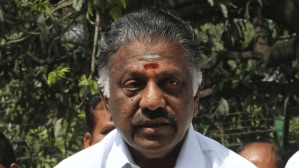Click here to join Express Pune WhatsApp channel and get a curated list of our stories
In Pune, ‘Gulabbo’ to present scars of Partition as Vaidehi Abhyankar-Sancheti debuts as theatre director
At the Jash-e-Uns festival in Pune, an intimate play about a girl and her grandmother, who came to India after Partition, will urge people to “vow never to do it again”.
 Vaidehi Abhyankar Sancheti. (Express Photo)
Vaidehi Abhyankar Sancheti. (Express Photo)When screenwriter, storyteller, actor and director Vaidehi Abhyankar-Sancheti was researching a story online and looking for Partition-era photographs she came across one that looked quite ordinary. It was of a young Punjabi couple around the early 1940s. “Would middle-class, working-class people of those times click photographs like this?” wondered Abhyankar-Sancheti.
The thought stayed in her mind and merged with another — India was celebrating 75 years of Independence and “in five years or so, there will not be any people left who crossed over from Pakistan during Partition”.
“Who will tell us their stories? Most of the emotions would get blunt or lost through generations. We will forget their suffering and the younger people will know about it only in history books,” she says. “We will not remember that when there is discord or violence between any two communities, all it leads to is pain. Our country has been a witness to such a painful time and a whole generation was scarred,” she adds.
A lifelong storyteller — she was the one who used to be selected to keep her class quiet with stories when the teacher was absent — Abhyankar-Sancheti created a story whose core emotion is to forgive. The story, in the form of an intimate play, Gulabbo, revolves around a girl, Simar, and her grandmother, who migrated during Partition and started her family in India. The grandmother is fascinated with the colour pink and insists she will get Simar a “chatakdar gulabi shaadi ka joda” because red is not fun.
Gulabbo will premier at The Box in Pune on September 21 at 3 pm. It is a part of a day-long festival by the organisation, Jashn-e-uns, and will feature their critically acclaimed first play, Noor Manzil, at 11 am at the same venue.
Abhyankar-Sancheti is from Maharashtra and does not have a personal connection with the horrors of Partition. “It is true that we, who live in the South or in the states who have not been directly affected, don’t know that pain. I had read these stories as I have been a student of Hindi. Punjabi literature is also full of stories from that time. I felt connected to Partition and wanted to have a story of the time,” she says.
Her research would involve not only wide reading but also real stories of people who crossed over to both sides. In a stroke of writer’s luck, she found out about Zaidi Photographers, a studio in Lahore where Md Ali Jinnah had been photographed, and where the image that had inspired Gulabbo was also taken.
The writer debuts as a theatre director with Gulabbo and presents it as a dramatised reading that is accompanied by the music of a tanpura, Mohan Veena, tabla and esraj, among others. “The Punjabi music helps us create the feeling of a Punjabi village,” she says.
As she prepares for the curtains to rise, the artiste is still thoughtful about the horrors of Partition. “I feel the need to tell this story because, in spite of how people were hurt by the Partition, we keep repeating the patterns. We must take a vow never to do it again.”
Click here to join Express Pune WhatsApp channel and get a curated list of our stories













